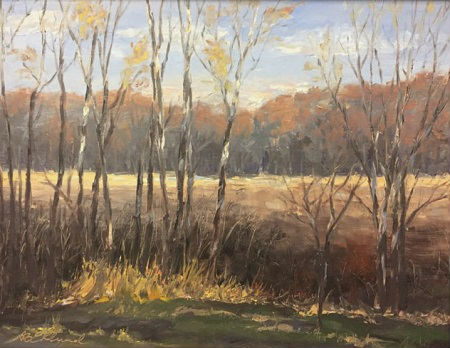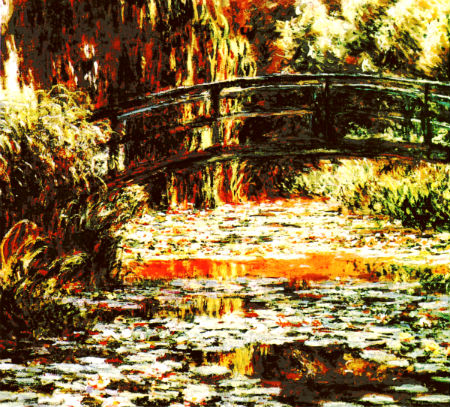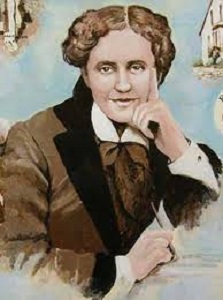Bij februari
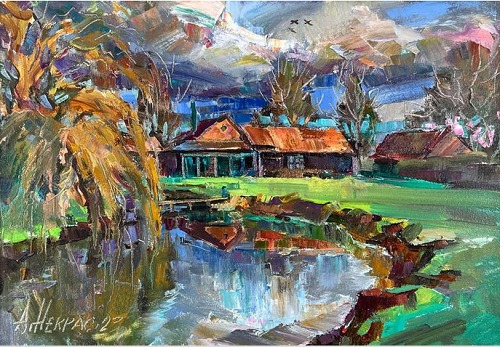
February
Still lie the sheltering snows, undimmed and white;
And reigns the winter’s pregnant silence, still:
No sign of spring, save that the catkins fill,
And willow stems grow daily red and bright.
These are the days when ancients held a rite
Of expiation for the old year’s ill,
And prayer to purify the new year’s will:
Fit days,—ere yet the spring rains blur the sight,
Ere yet the bounding blood grows hot with haste
And dreaming thoughts grow heavy with a greed
The ardent summer’s joy to have and taste:
Fit days—to take to last year’s losses heed,
To reckon clear the new life’s sterner need;
Fit days—for Feast of Expiation placed!

Amherst, Massachusetts, de geboorteplaats van Helen Maria Hunt Jackson
De Oostenrijkse dichter en schrijver Hugo von Hofmannsthal werd geboren op 1 februari 1874 in Wenen. Zie ook alle tags voor Hugo von Hofmannsthal op dit blog.
Liedchen des Harlekin
Lieben, Hassen, Hoffen, Zagen,
Alle Lust und alle Qual,
Alles kann ein Herz ertragen
Einmal um das andere Mal.
Aber weder Lust noch Schmerzen,
Abgestorben auch der Pein,
Das ist tödlich deinem Herzen,
Und so darfst du mir nicht sein!
Mußt dich aus dem Dunkel heben,
Wär es auch um neue Qual.
Leben mußt du, liebes Leben,
Leben noch dies eine Mal!
Kleine Blumen …
Kleine Blumen, kleine Lieder,
Heller Klang und bunte Pracht,
Blumen, die ich nicht gezogen,
Lieder, die ich nicht erdacht: –
Und ich selber hätte nichts,
Dir zu bringen, Dir zu danken,
Sollte heute, heute schweigen?
Ach, was mein war, die Gedanken,
Sind ja längst, schon längst Dein Eigen.
Blütenreife
Die Blüten schlafen am Baume
In schwüler, flüsternder Nacht,
Sie trinken in duftigem Traume
Die flimmernde, feuchte Pracht.
Sie trinken den lauen Regen,
Den glitzernden Mondenschein,
Sie zittern dem Licht entgegen,
Sie saugen es taumelnd ein:
Sie sprengen die schweigende Hülle
Und gleiten berauscht durch die Luft
Und sterben an der Fülle
Von Glut und Glanz und Duft.
Das war die Nacht der Träume,
Der Liebe schwül gärende Nacht,
Da sind mit den Knospen der Bäume
Auch meine Lieder erwacht.
Sie sprengten die schweigende Hülle
Und glitten berauscht durch die Luft
Und starben an der Fülle
Von Glut und Glanz und Duft.
Ballade van het uiterlijk leven
En kind’ren groeien op met vragende ogen,
Die van niets weten, groeien op en sterven,
En alle mensen gaan hun eigen wegen.
En zoete vruchten, aan den boom voldragen,
Vallen des nachts als dode vogels neder
En zijn bedorven binnen weinig dagen.
En altijd waait de wind en telkens weder
Zijn wij van vele woorden dof geworden
En voelen lust en matheid onzer leden.
En straten gaan door ’t gras en steden, dorpen
Zijn hier en daar vol fakkels, bomen, vijvers,
Soms dreigende, soms dodelijk verdorde…
Waarom zijn zij gebouwd? en zij gelijken
Elkander nooit en zijn ontelbaar vele;
Waartoe dient lachen, wenen en bezwijken?
Wat doen ons deze dingen, deze spelen,
Ons eenzamen, die zich vergeefs vermoeien
En zwervend zonder doel hun noodlot delen?
Alles gezien te hebben, wat kan ’t baten?
En toch zegt hij al veel, die ‘avond’ zegt,
Een woord, waaruit heimwee en treurnis vloeien
Als zware honing uit de holle raten.
Vertaald door H. W. J. M. Keuls
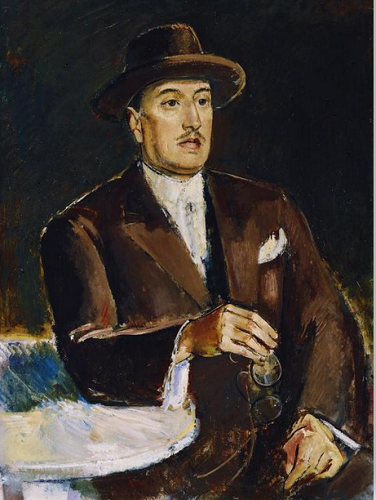
Portret door Anton Faistauer, 1928
Zie voor nog meer schrijvers van de 1e februari ook mijn blog van 1 februari 2022 en ook mijn blog van 1 februari 2019 en ook mijn blog van 1 februari 2015 deel 2.

